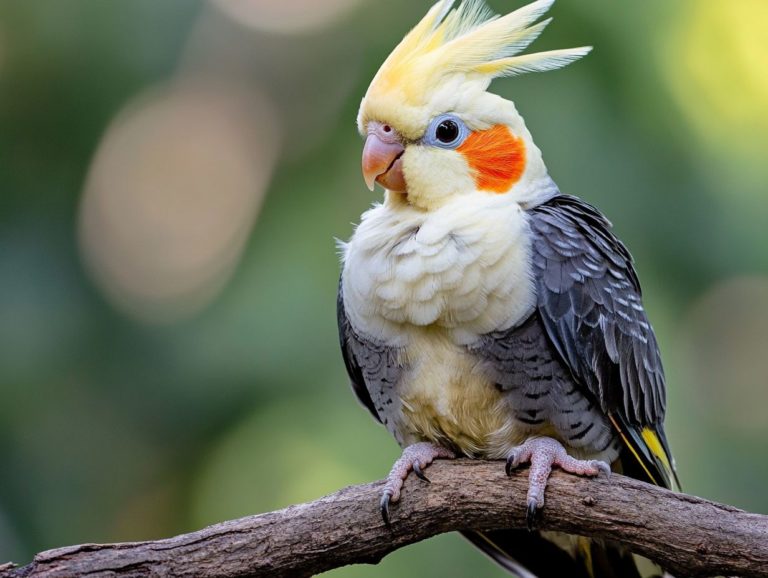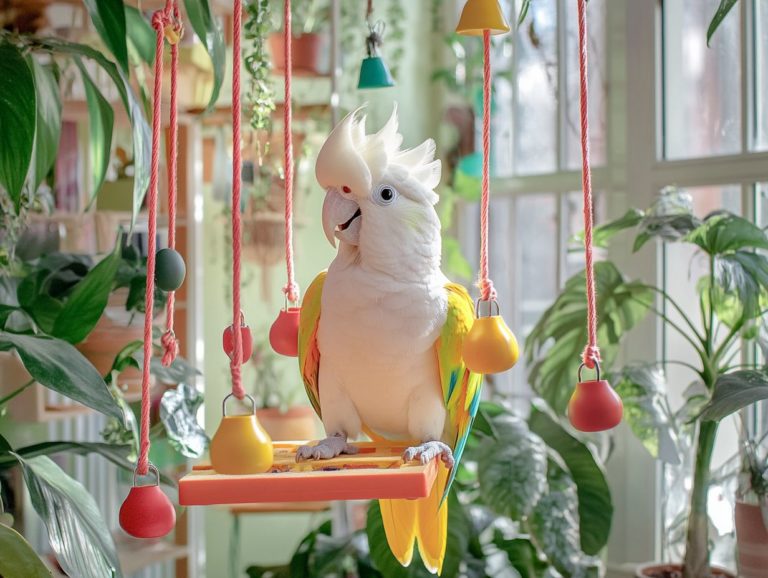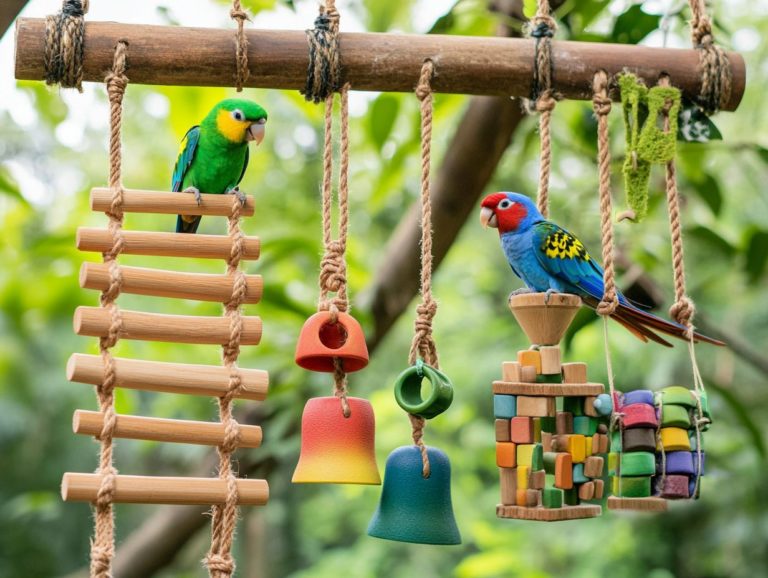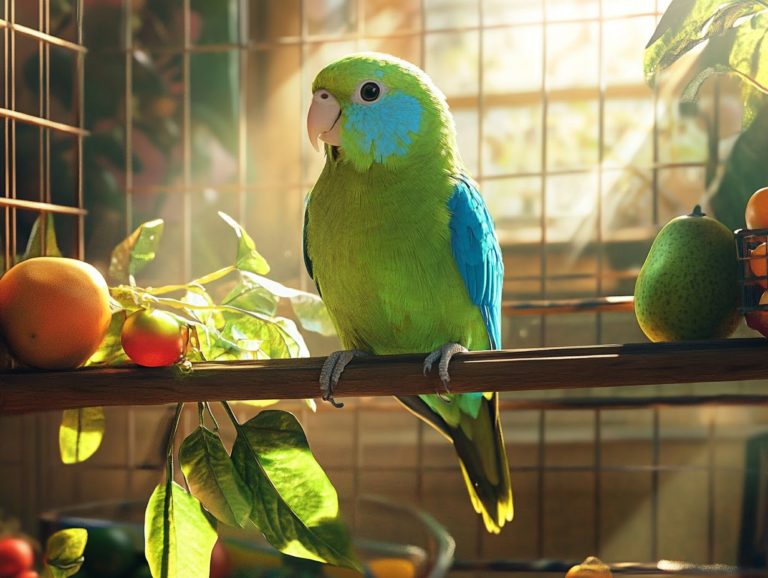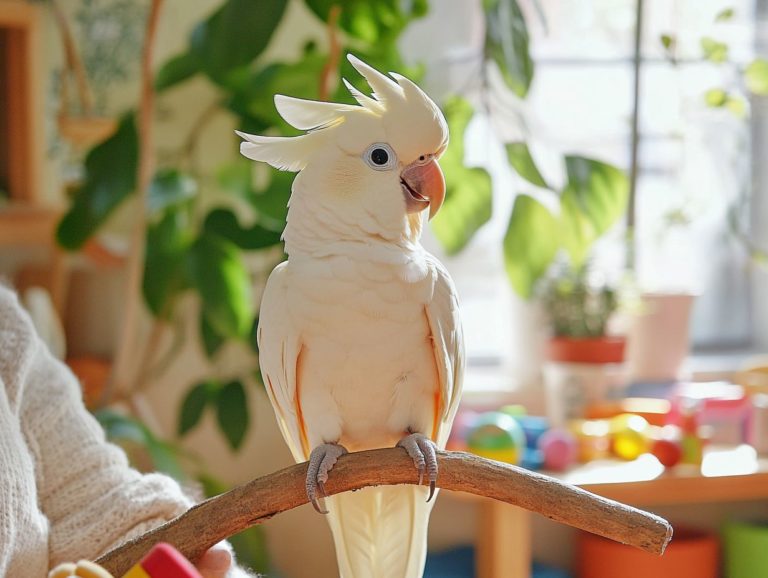Finch Breeding: What You Need to Know
Breeding finches, particularly zebra finches, can transform your life! This guide equips you with everything necessary, from selecting the right finch species to crafting the perfect breeding environment.
You’ll explore the entire breeding process, including mating, nesting, and the vital stages of egg incubation and hatching. It also provides essential tips for caring for finch chicks and tackling common health issues related to finch health.
Immerse yourself in this journey to successfully navigate the world of finch breeding, with insights into finch species bonding and breeding tips!
Contents
- Key Takeaways:
- Why Breed Finches?
- Choosing the Right Finch Species
- Preparing for Breeding
- Breeding Process
- Caring for Finch Chicks
- Frequently Asked Questions
- What is finch breeding and why is it important to know about?
- What do I need to know before attempting to breed finches?
- Wondering if your finches are ready to breed?
- Do I need to provide a special diet for breeding finches?
- How long does the breeding process typically take for finches?
- What do I do if my finches do not successfully breed?
Key Takeaways:
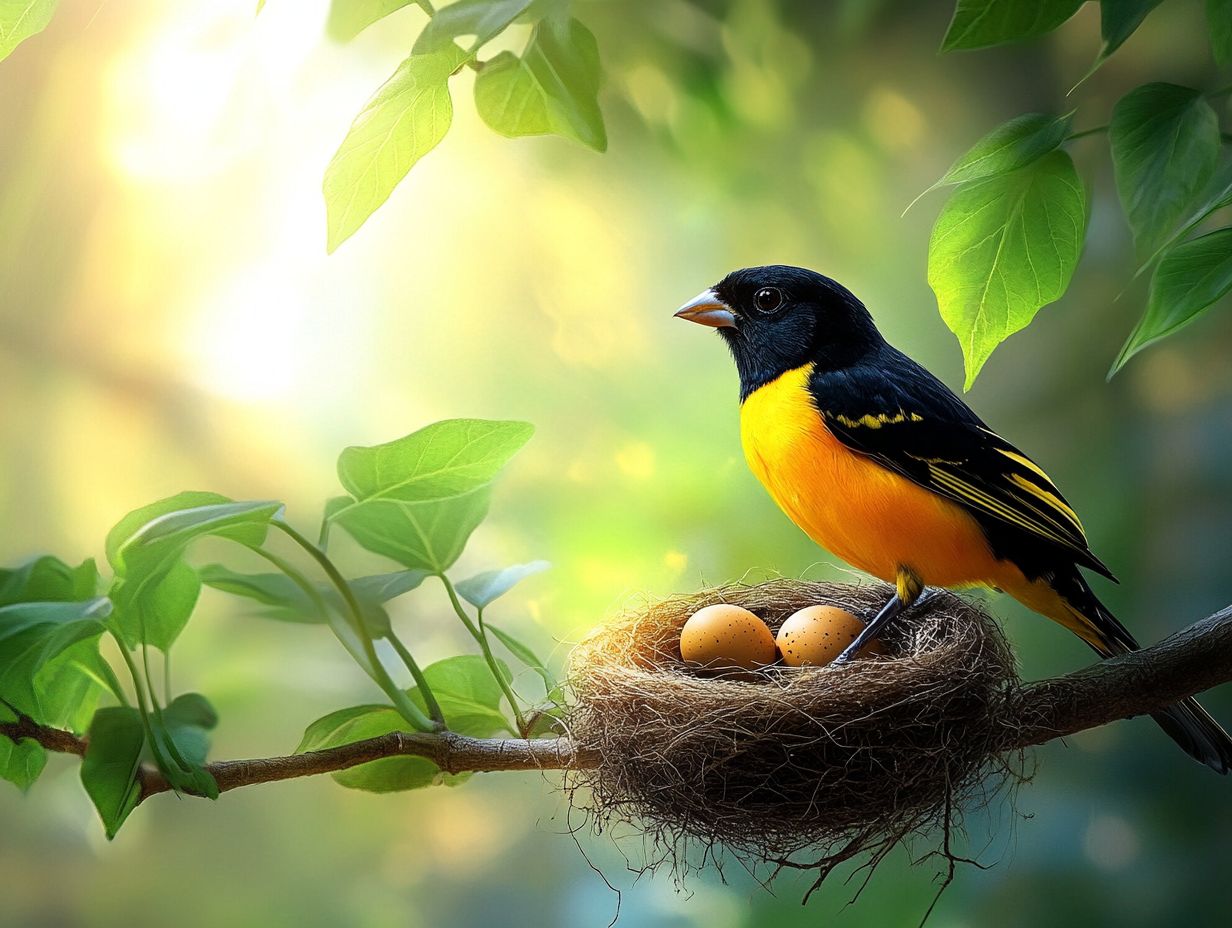
- Experience the joy of new life with finches!
- Choose compatible species for the best breeding results.
- Ensure proper nutrition and care for thriving chicks.
Why Breed Finches?
Breeding finches, particularly zebra finches, is a rewarding journey for anyone who appreciates the unique beauty and lively songs of these charming birds. By understanding the different finch species and their breeding needs, such as finch diet and nesting material, you can ensure a successful breeding process that enhances their health and well-being and fosters an environment where their natural behaviors can thrive.
The joy of raising baby birds offers an unparalleled sense of fulfillment as you witness their transformation from delicate chicks to vibrant companions. This experience encourages socialization among these social birds, strengthening bonds among the finches and deepening the connection between the birds and their caregivers.
To maintain a healthy environment, it’s essential to provide a large flight cage, fresh foods, and clean water, while remaining vigilant for any signs of illness. Regular interactions and gentle handling nurture trust, allowing the lively personalities of your zebra finches to truly shine and enhancing their overall vitality. Their melodic songs will fill your space with energy, enchanting everyone who shares in their lives.
Choosing the Right Finch Species
Selecting the ideal finch species is essential for breeding successfully, and zebra finches, known for their friendly demeanor, stand out as a top choice. Their vibrant plumage and essential breeding requirements make them particularly appealing.
By familiarizing yourself with the characteristics of different finch species, including male and female finches, you can make an informed decision when choosing the best breeding pair. This careful selection ensures compatibility and promotes the health and vitality of the finch offspring.
Factors to Consider
When considering breeding finches, especially zebra finches, it’s crucial to assess the compatibility of the breeding pair, the conditions they’ll be in, and the overall health of the finches involved. Consider how factors like the size of the enclosure, socialization, and finch nutrition can profoundly impact your breeding efforts.
The layout of the enclosure is key; it should be spacious enough to allow for flight and equipped with suitable nesting materials that reflect their natural habitats. The social dynamics among the finches matter too; harmonious pairings often lead to healthier offspring, which is crucial in the breeding process. Ensure their diet is rich in seeds, greens, and supplements, such as high-quality finch seed and avian calcium supplements, which keep them in peak condition and enhance their reproductive capabilities.
Finally, pay close attention to environmental conditions temperature and humidity included to ensure optimal egg-laying conditions. Creating a stress-free atmosphere is essential for fostering successful bonding and nurturing of the young finches, significantly impacting chick development.
Preparing for Breeding
Preparing for the breeding of zebra finches requires you to create an ideal environment tailored to their specific needs, ensuring their finch care is both thorough and attentive.
A spacious flight cage is essential, complete with a nesting box and appropriate nesting materials to encourage natural breeding behaviors and facilitate successful egg-laying, which is critical for healthy baby birds.
Creating the Right Environment
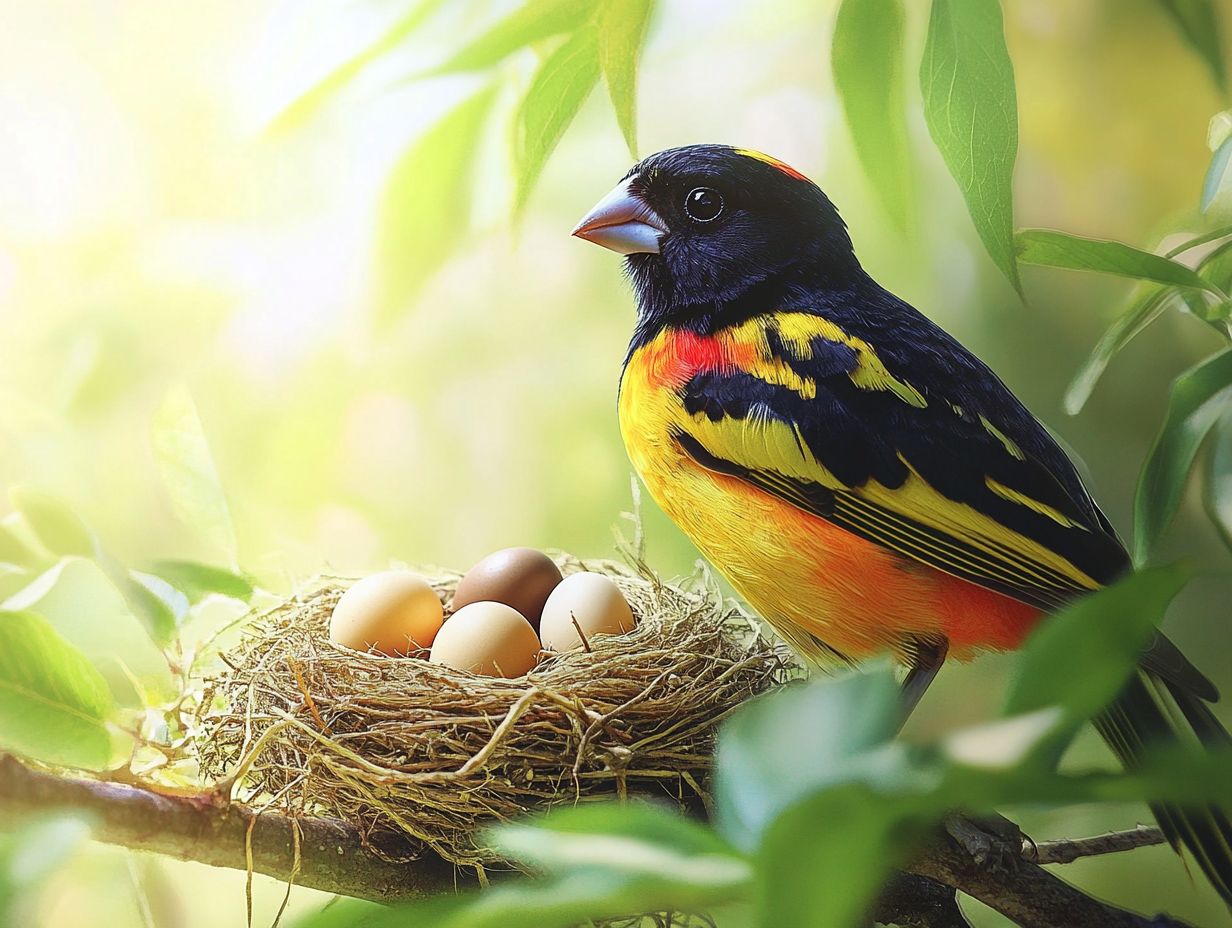
Creating the right environment for breeding finches is essential for their success and well-being, ensuring they thrive in their finch enclosure. Focus on replicating their natural habitat by using bird-safe materials for the enclosure, ensuring ample space for socialization, and maintaining optimal temperature and humidity levels.
The importance of these environmental factors cannot be overstated; finches flourish in conditions that closely resemble their natural surroundings, which is vital for finch behavior. Temperature is critical, as moderate warmth fosters activity and vitality, while the right humidity levels are vital for maintaining their health and promoting impeccable feather condition, essential for their appearance.
Providing ample space allows these birds to engage in natural breeding behaviors, including courtship rituals and nest-building, crucial for successful finch mating.
By crafting a harmonious environment, you not only support the finches’ reproductive success but also enhance their overall well-being, contributing to the health of finch parents and their chicks. Enthusiasts must prioritize these conditions in their finch care practices, especially regarding fresh foods and finch feeding routines.
Feeding and Nutrition
Feeding your finches the right food is vital for their thriving and energetic lives! Proper feeding and nutrition are essential for breeding finches, as a well-balanced diet that includes high-quality finch seed directly influences their health and the successful rearing of their chicks.
By providing high-quality finch seed, fresh foods, and calcium supplements for birds, you ensure that the breeding pair remains healthy and capable of producing strong eggs, which is crucial for chick development.
To cultivate a nourishing environment, consider incorporating organic fruits and vegetables such as spinach, kale, and berries. These not only excite their palate but also deliver vital vitamins and minerals necessary for the health of the finch offspring.
Including protein sources, like boiled eggs or specialized avian pellets, will enhance the overall vigor and energy levels of these lively birds, promoting their finch health.
It s equally important to regularly offer calcium sources, such as cuttlebone or mineral blocks, as these strengthen eggshells and promote the well-being of both parents and their offspring. Adopting a holistic approach to finch nutrition fosters not just reproductive success but also vibrant and active pet finches, enhancing their overall enjoyment for bird owners.
Breeding Process
The breeding process in finches commences with a captivating courtship ritual. During this time, male finches perform intricate displays to entice female partners and solidify their bond. This enchanting dance leads to successful mating and the eventual laying of finch eggs, an exciting milestone in their breeding process.
To foster healthy offspring, it’s crucial for bird owners to grasp the stages of this breeding process, including the incubation period and the meticulous hatchling care required for the eggs. Understanding these elements will ensure a thriving environment for your finch family, providing a healthy habitat for all finch parents and chicks.
Mating and Nesting
Mating and nesting are essential components of the breeding cycle for finches, especially for zebra finches. The breeding pair displays specific behaviors to establish their territory and prepare for the arrival of eggs.
Placing a thoughtfully positioned nesting box filled with suitable bird-safe nesting materials can greatly enhance the likelihood of successful nesting. This ultimately leads to the laying of finch eggs.
During courtship, finches engage in enchanting displays. They perform intricate songs and captivating flight patterns that showcase their behavior. The male performs elaborate dances to showcase his vigor and fitness to attract the female, ensuring a strong breeding pair.
Once paired, they search for ideal nesting locations. They typically opt for secluded spots that provide safety and comfort, which are crucial for finch health. The choice of nesting box is vital; it must be secure and spacious enough to accommodate their young once hatched.
Inside the box, they carefully gather soft materials such as grass, leaves, and feathers. This creates a cozy environment that promotes healthy development for the finch eggs. This careful nesting process shows just how crucial proper practices are in the successful upbringing of their offspring, impacting overall finch care.
The Exciting Journey of Egg Incubation!
Once the finch eggs are laid, the incubation phase begins. Both parent finches usually share the responsibility of keeping the precious eggs warm and safe. It s essential to grasp the nuances of the incubation period and subsequent hatchling care to ensure the health of both the baby birds and their devoted parents.
This incubation period typically lasts about two weeks. The parents take turns sitting on the eggs to provide warmth and protection from lurking predators. This ensures quality hatchling care.
You might notice that one parent is more active in this role, while the other goes foraging. This balance is crucial for maintaining a healthy environment for their growing family.
As the eggs start to hatch, usually in a staggered manner, the hatchlings emerge featherless and utterly reliant on their parents for warmth and nourishment. Attentive hatchling care is vital during these critical early days.
Care from both adults gives the chicks the best possible chance for survival and growth. This ensures that finch feeding is well managed.
Caring for Finch Chicks
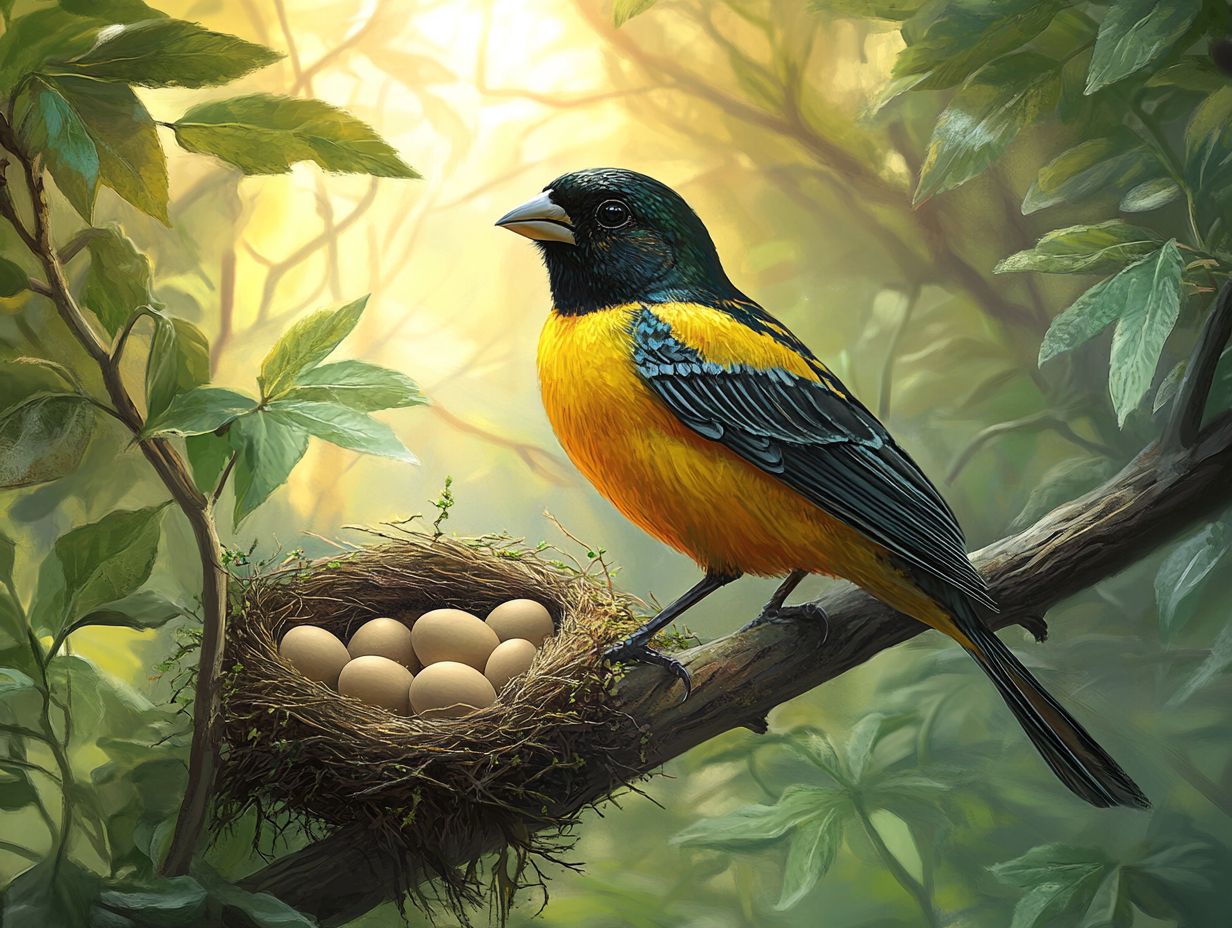
Caring for finch chicks is a detailed endeavor that begins right after they hatch. It demands keen attention to their feeding and growth, particularly focusing on their nutrition.
Providing the right nutrition during this crucial phase is vital. It supports their development and paves the way for a seamless weaning experience. Weaning is the process where chicks learn to eat solid food and gradually stop relying on their parents feeding.
Feeding and Growth
Feeding and growth are closely connected in the early stages of a finch chick’s life. It is essential for you, as a bird owner, to provide a diet rich in nutrition. This should include high-quality finch seed along with fresh foods.
A balanced diet supports healthy development and prepares the chicks for their eventual weaning.
Along with finch seed, consider incorporating soft and easily digestible options such as boiled eggs, finely chopped vegetables, and fruits. These additions can significantly enhance their nutritional intake.
Establishing a feeding schedule tailored to the specific needs of the developing chicks is critical. Regular and varied meals can stimulate their appetite and foster growth.
Utilizing specialized chick-formula mixes designed specifically for finches will ensure they receive all the necessary vitamins and minerals.
Keep a close eye on their feeding habits and adjust portion sizes based on their individual growth patterns. This attentive approach will positively contribute to their overall health and vitality.
Common Health Issues and How to Address Them
Understanding common health issues in finch chicks is important for keeping them healthy. If not properly addressed, physical abnormalities can arise during development.
By providing a balanced diet that includes calcium supplements made for birds, you can promote strong growth and reduce potential health concerns.
Stay vigilant in recognizing signs of distress or illness, such as lethargy or unusual feathering, which could signal underlying problems. Regular veterinary check-ups will be key for early detection of health issues, enabling timely interventions.
Creating a clean and safe living environment is essential; it significantly reduces the risk of infections and stress, both critical to a chick’s development. By being aware of these issues and taking proactive measures, you can significantly boost the quality of life for these delicate birds.
Tips for Successful Finch Breeding
Successful finch breeding requires a multifaceted approach that emphasizes finch care, creating a healthy environment, and understanding finch behavior. By implementing specific breeding tips, you can greatly improve your chances of raising healthy finches and ensuring a thriving breeding experience.
To start, establish a consistent care routine that includes daily feedings, fresh water, and regular cage cleaning. Select a spacious cage equipped with nesting boxes, as finches flourish in environments that mimic their natural habitats.
Providing a variety of perches and toys will cater to their social and physical needs, keeping them engaged and happy. Regarding their diet, incorporating a mix of high-quality seed blends, along with fresh fruits and vegetables, will support their overall health and encourage healthy breeding behaviors.
Observing the interactions between your birds can offer valuable insights into their comfort levels and readiness to breed, allowing you to create the perfect conditions for success.
Frequently Asked Questions
What is finch breeding and why is it important to know about?
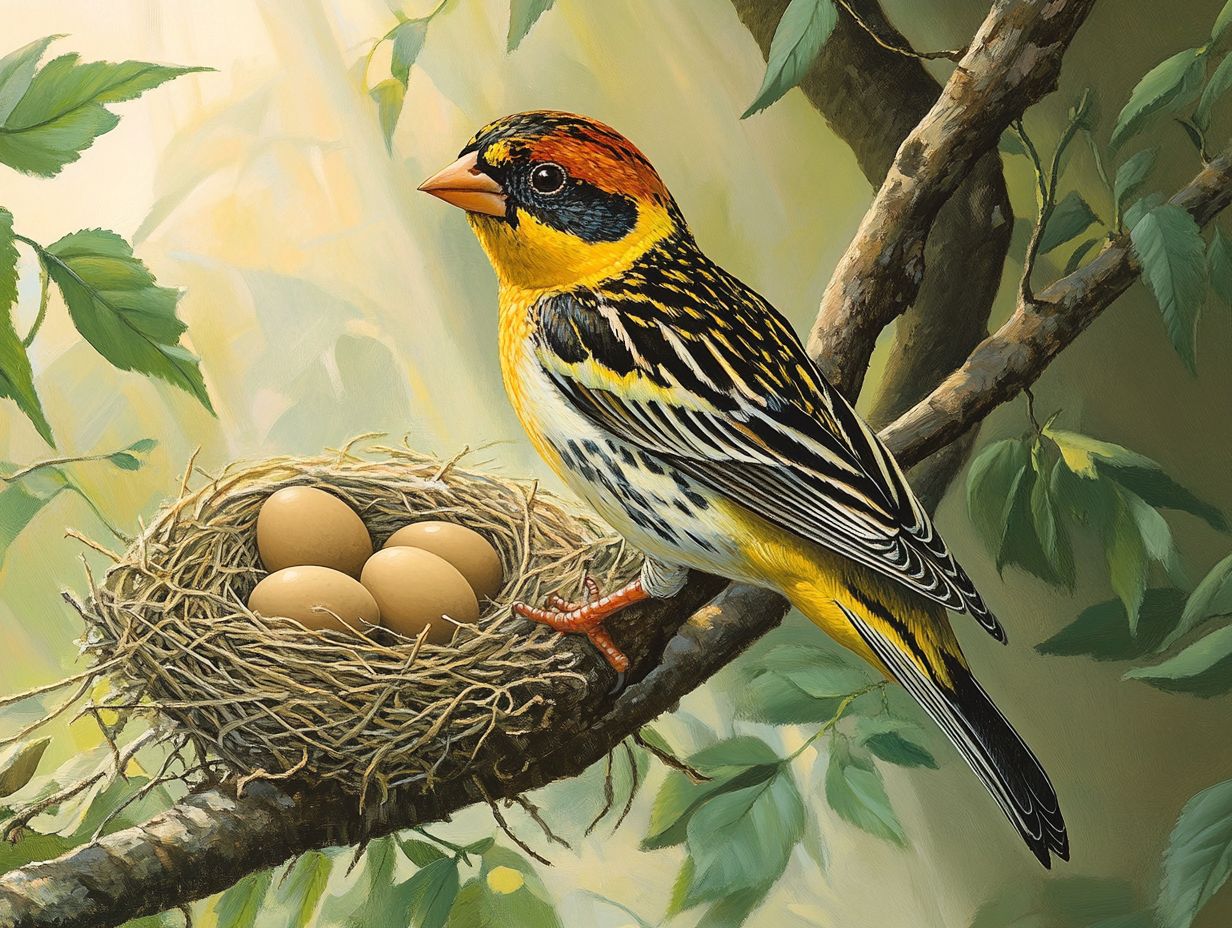
Finch breeding is the process of mating and caring for finches to produce offspring. It’s important to know about bird breeding because it allows for the continuation of the species and can be a rewarding experience for bird owners.
What do I need to know before attempting to breed finches?
Before attempting to breed finches, it’s essential to have a basic understanding of their behavior, dietary needs, and appropriate living conditions. Additionally, you should refer to finch feeding: a guide to proper nutrition and have a plan for caring for the chicks once they hatch.
Wondering if your finches are ready to breed?
You can determine if your finches are ready to breed by observing their behaviors, such as building nests, displaying mating rituals, and singing more frequently. Consulting with a veterinarian can provide a professional opinion.
Do I need to provide a special diet for breeding finches?
Yes, it s important to provide a balanced and nutritious diet for breeding finches. This includes high-quality seeds, fresh fruits and vegetables, and calcium supplements for the female finch.
How long does the breeding process typically take for finches?
The breeding process for finches can vary, but it typically takes about 2-4 weeks for the female finch to lay eggs after mating. The eggs then take about 12-14 days to hatch, and the chicks will leave the nest after 3-4 weeks.
What do I do if my finches do not successfully breed?
If your finches do not successfully breed, assess the potential reasons, such as inadequate living conditions, improper diet, or health issues. Consulting with a veterinarian may provide further guidance.
Start your finch breeding journey today and create a thriving home for these beautiful birds!

